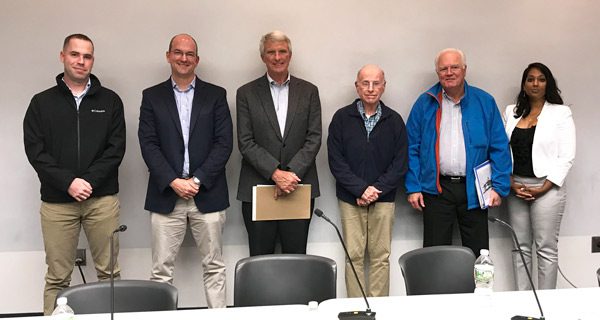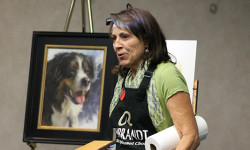By Lisa Moore
Hometown Weekly correspondent
Last week in the Wakelin Room of the Wellesley Free Library, a panel of local veterans convened to share their experiences during their years of service and to discuss their transitions back to civilian life. As part of the Wellesley Reads Together 2017 Program, which this year chose the book “Civilianized: A Young Veteran's Memoir” by Michael Anthony, two veterans panels were assembled by Director of Veteran Services, Staff Sergeant First Class Sarada Kalpee, who has served in the US Army Reserves since 2002.
Last week’s panel, moderated by SSG Kalpee, assembled Wellesley veteran Lieutenant Junior Grade Joe Cavanaugh (Navy, 1959-1962), Lieutenant Toby Decker (Army, 1965-1967), Major James Stokes (Marines, 1966-1986), Captain Mark Price (Navy, 2007-present), and Staff Sergeant Bradley Moffitt (Army, 2009-present). Each man shared a glimpse into his unique service experience, and transition back to civilian life.
Joe Cavanaugh was the first to share his story. Lt. Cavanaugh had the choice of being drafted into the Army or joining the Navy. “I wanted to see the world, so I joined the Navy,” he said.
And see the world he did, starting on a supply ship at bases in Antarctica, close to the South Pole. He shared his experience of travelling through ice pack, following icebreakers but sometimes being forced to break the ice on their own. “It was an amazing experience. I saw penguins, and whales - things I would never had seen. Our mission was to offload a closed base and bring supplies to a new base.”
Cavanaugh’s second ship was an LST. These ships carried tanks. Tanks would be deployed when the LST would drop a stern anchor that helped hold the ship to the shore. A highlight of that time for Cavanaugh was ironically after sustaining a leg injury that left him in an infirmary in Puerto Rico. After he was able to return to the ship, he had to take a helicopter to its location and was lowered down to the ship on a wire. “That was a lot of fun for me, I have a great memory of that.”
His third ship was the USS Intrepid, where he was part of a crew of 4,000. He recalled some memories of his time on the Intrepid, like how he was in the Mediterranean during a hurricane that tore off part of the ships bow, and how as an engineering officer, he loved to watch the flight operations off the bow of the ship. He explained the dangers pilots faced as they took off or landed on the carrier deck, and how they lost three pilots during his tour aboard ship.
One fond memory Cavanaugh shared occurred on May 24, 1962, when his ship was sent to pick up Astronaut Scott Carpenter, who landed 262 miles south of his attended impact point. Two helicopters were deployed from his ship to pick up Carpenter. All 4,000 crewmates aboard the ship came out to greet the returning astronaut, who was a fellow Navy man.
Cavanaugh got out of the Navy on December 14, 1962. He explained that for him, transition to civilian life was smooth and easy; getting engaged to his wife two weeks after returning home, moving to New York shortly after to work for Proctor and Gamble, eventually having four children and today six grandchildren.
Toby Decker was the next to share his story. He served in the US Army during the Vietnam War from 1965-1967. He was assigned to ICOR, the Infantry Combat Regimen with a mission of ensuring that radio communications functioned between US planes and ground troops. He was stationed with the northern most tactical units and worked with the US Marine troops that where stationed there at that time. For Decker, serving at a different time, in a very different war, his experiences were not filled with fond memories.
Decker would be the fourth generation in his family to serve during wartime. After joining the ROTC at Bucknell University, he volunteered for the Marines and was assigned on June 12, 1966. Lt. Decker spoke about how he and a dozen other survivors of the Vietnam War get together annually. Decker said that “The big question we all ask ourselves, but never out loud, is ‘was it worth it?’” Following his family, he entered the Army wanting to serve the country he loved. When he went to Vietnam, he and the other soldiers entered a world vastly different from their hometowns.
“No one told us about the culture or about the people of Vietnam, we knew nothing. I flew over and when we stepped off the plane in Saigon, the air was so hot it took your breath away.” Lt. Decker shared how the Vietnam War was confusing for the soldiers, and that the war was not being fought as previous wars had been. He said the soldiers lacked a clear mission, stating: “Is that what our mission was, to kill more of them than they killed of us?”
One difficult memory he shared was of an occasion where an Air Force officer “settled a score” after his co-pilot was captured in a village by the Viet Cong after being shot down and turned in by the local villagers. The Air Force officer took a plane up over the village and strafed it, wounding 1,500 people, including women and children. “This was wrong, this was not the right way to fight this war,” remarked Decker.
Transitioning back to civilian life was very challenging for Lt. Decker. “When I got home to Pennsylvania the demonstrations started,” he said, “I learned quickly to never tell anyone I served in Vietnam. I got a job working for the Colgate-Palmolive company and told no one. It was not until Iraq that our service was legitimized.” Even after serving bravely and coming home to calls of “baby killer,” Lt. Decker still has a love for his country. “I love my country, there is none like it. We are a great country that has done so much. I just hope that our current leaders learn from Vietnam.”
Major James Stokes started his service in the Marine Corps as a Second Lieutenant out of the ROTC program at Holy Cross, serving from 1966-1986. His experience of going through the Marine Corps and ROTC program was different. With a draft at the time, his choice was either to enlist, get drafted, or go to college and join the ROTC. He said his Marine Corps training was “interesting and intensive.” After being found suitable for flying, Maj. Stokes spent time in Quantico, VA, and came out of that training cleared to be a pilot.
“It was fun. I flew out of a civilian airport,” he said. Flying a plane called Phantom, Maj. Stokes recalled how he left his spouse behind to go to South East Asia where he trained on state of the art planes. Maj. Stokes’ service had him involved in bombings over Laos to support ground troops that were being attacked from behind, where US troops were backed up by an Australian Army. “My reward for getting through Vietnam and Laos was to be based south of Hiroshima.” There, Maj. Stokes spent time in dogfights with the Russians and North Koreans. “Nobody knew what we were doing. The world at large didn’t know we were in North Japan. It was not the vision we expected, but we prevailed when North Korea and the Russians left Japan. After that, I went home. I was sent to Hawaii where life was safer and easier.”
Captain Mark Price shared that growing up, he idolized the men like those on the panel that had served before him. After witnessing the fall of the Twin Towers in NYC on 9/11, he considered joining the Navy. When he went to college, the ROTC did not appeal to him so he went to med school. Through several steps on his journey, he opted to not join the Navy. After med school, he worked at Mass General. In his early thirties, shortly after the birth of his third child, while attending a lunch seminar, he saw a Navy recruiter. He brought home a sign-up sheet and after talking it through with his wife, he finally joined the Navy.
After being identified by the Bureau of Medicine as an orthopedic surgeon, he was deployed to Afghanistan. In August of 2012, Capt. Price was in training and was assigned as the leader of a forward surgical team attached to special-ops groups. His job was to triage men, collect wounded soldiers, and aid the Afghani people, too. In Northern Afghanistan, he helped many amputees, those wounded by IED’s. After the many surgeries and witnessing the depths of human depravity, he recalled that through it all, he “took pride that we got to send men home. Maybe not the same way they left, but they survived.”
Capt. Price shared a memory of one wounded soldier. After suffering the loss of both of his legs, he still wanted to get back to his unit. “I had a meaningful experience with the Afghan people. Nothing I do professionally will ever measure up to my experience there.”
After serving in a Red Zone, constantly amped up, always under extreme stress, returning home to civilian life was a challenge. “It took a while to come down from that, but now I deal with trauma, and it is much easier here.”
The last man to share his story was NCO Staff Sergeant Bradley Moffitt, who has served in the US Army since 2009. Sgt. Moffitt was two weeks away from going to college on a full scholarship when he visited a buddy in Fort Leavenworth. He came home the next day after that visit and went to a recruiter’s office. At only 17 years old, he required his parents’ signature to join the military. “I went home and told my mother I was not going to college, I was joining the military.” His mother made him come up with the pros and cons of each branch of service, and only agreed to sign the papers if he stayed away from combat areas. Sgt. Moffitt settled on the Army, joining as a mechanic. In June of 2010, he was sent to Fort Riley Kansas and was frustrated to “not quite be seeing the world”. Four days later, he was pulled aside to do a convoy security detachment. He saw this as “a way to see combat.”
A few months later, on November 2, he was deployed to Iraq. He went through two weeks of weapons training and acclimatization before embarking on a year-long mission with 60 men and 20 trucks providing security to supply convoys as they went through central Iraq.
On December 17 at 1:42 a.m., an IED went off eight feet away from Sgt. Moffitt’s head. “I don’t remember it.”
Recalling the incident, he credits his survival to an angel. After completing his mission, he returned to base. Once he received medical clearance, he went to the trailer to call his mother. “I told her: ‘Mom, the war just got real.’” He would experience being blown up five more times on that tour. “I came home in a dark place.”
After moving off post with buddies, he tried to cope with the aftermath of his experiences. In 2013, he proposed to his wife prior to being deployed to Djibouti, Africa, a central hub for many Middle East operations, where he held a desk job. After a six-month deployment, he was sent to Kuwait with a forward support company.
Seeing Syrian refugee camps, he realized the war was affecting more than just America. His experience left him frustrated, wanting to earn more money for his efforts. He returned home looking to go to college and commission back in the Army as higher rank. While the transition from Army to civilian life has been difficult at times for Sgt. Moffitt, he has learned to cope. “Coming home, life keeps going on. My wife helped me to cope and ease back into things. Each time gets easier, I have learned when I come home I leave the military at the front door.”
Thank you to all of these veterans for their years of service, the sacrifices they made, and for sharing their stories with the public, some for the very first time.
Next week, the women in service will share their stories.

























